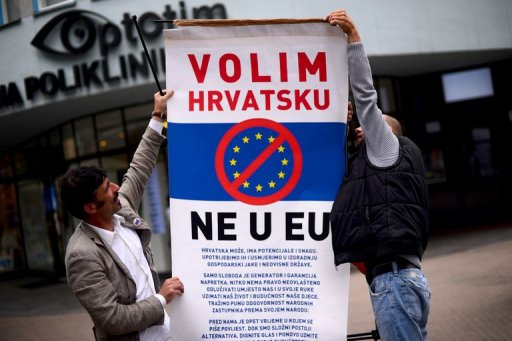Croatia on Sunday stages celebrations to mark its historic entry into the European Union as the bloc’s 28th member, almost two decades after the end of the Balkan state’s bloody war of independence from the former Yugoslavia.
Symbolically, at midnight on Sunday, the “Customs” sign will be removed at a border crossing with Slovenia, the only other former Yugoslav republic that has joined the EU since the breakup of the ex-communist federation in 1990s.
At the same time, the “EU” sign will be put up on the land border with Serbia, another ex-Yugoslav republic with which the bloc agreed on Friday to open membership talks by January.
The two events will be broadcast live at the capital Zagreb’s main square, where celebrations to be attended by more than 100 European dignitaries are to be held.
Beethoven’s “Ode to Joy” — the EU’s anthem — will be played after which officials, notably European Commission President Jose Manuel Barroso and President Ivo Josipovic, will address those present.
Heads of state from all six ex-Yugoslav republics will attend the ceremony, but leaders of many EU member states — including Britain, France and Germany — will not be present.
Thousands of Croatians were also expected to gather at the Zagreb central square where some 700 artists — singers, musicians and dancers — will stage performances.
Croatia’s cultural heritage as well as key inventions of the Balkan country, ranging from the ultimate menswear accessory — tie or cravat — to power transformer, will be showcased.
Croatia will be the first new member of the EU since Bulgaria and Romania joined in 2007.
President Ivo Josipovic told AFP recently that the “celebration will be nice and emotional, and of course modest due to economic situation”.
After all, the country has been either in recession or stagnation since 2009 and unemployment stands at about 20 percent.
But the centre-left government hopes that the EU entry would attract badly needed foreign investment and boost the economy.
Tough demands made by the EU in exchange for membership has nevertheless dampened the enthusiasm of Croatians for the bloc. Support for membership is now at just about 50 percent, down from the 66 percent recorded during a referendum last year.
At the same time, EU itself is struggling with recession in nine of its member states and with the eurozone debt crisis.
Figures from the EU’s statistics office show that Croatia, which has a population of 4.2 million, would be among the bloc’s poorest.
The country’s per capita gross domestic product (GDP) is 39 percent below the EU average, with only Romania and Bulgaria behind it.
But, 48-year-old Tihana Strmecki does not share the view.
Apart from agreeing to soon open talks with Serbia, EU leaders this week also gave the green light for launching talks on an association deal with Kosovo, the first step on the long path to join the bloc.
Brussels-based analysts believe that the accession of Croatia and opening to Serbia were key milestones for the volatile Balkans, but warn that the EU was pursuing a more cautious strategy than in past enlargements.

COMMENTS
Please let us know if you're having issues with commenting.